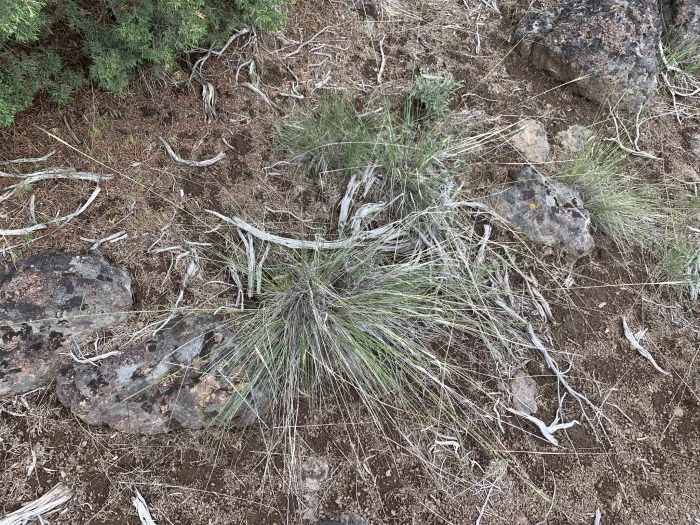Thurber’s Needlegrass
(Eriocoma thurberiana)
Thurber’s Needlegrass (Eriocoma thurberiana)
/
/

© mark-groeneveld
CC BY 4.0
Image By:
© mark-groeneveld
Recorded By:
Copyright:
CC BY 4.0
Copyright Notice:
Photo by: © mark-groeneveld | License Type: CC BY 4.0 | License URL: http://creativecommons.org/licenses/by/4.0/ | Uploader: mark-groeneveld | Publisher: iNaturalist |

























Estimated Native Range
Climate Requirements
| • Precipitation | 6" - 94" |
| • High Temp. | 59°F - 99°F |
| • Low Temp. | 2°F - 40°F |
Summary
Eriocoma thurberiana, commonly known as Thurber’s needlegrass, is a tufted perennial grass that is native to a variety of habitats including sagebrush deserts, pinyon-juniper woodlands, and open grasslands in the western United States. Its range extends from Washington to California and east to Montana and Wyoming. This species typically grows to about 30 inches tall and is characterized by its narrow panicles and long, hairy awns that can catch the wind for seed dispersal. Thurber’s needlegrass is an important component of the ecosystem, providing habitat and food for a variety of wildlife.
Thurber’s needlegrass is valued for its role in erosion control and as a forage species for livestock and wildlife. It is adapted to a range of soil types but prefers well-drained soils and can tolerate drought conditions, making it suitable for xeriscaping and restoration projects. It thrives in full sun and requires minimal maintenance once established. However, it is not commonly used in ornamental horticulture due to its less showy nature. Potential problems include overgrazing, which can reduce its ability to compete with invasive species.CC BY-SA 4.0
Thurber’s needlegrass is valued for its role in erosion control and as a forage species for livestock and wildlife. It is adapted to a range of soil types but prefers well-drained soils and can tolerate drought conditions, making it suitable for xeriscaping and restoration projects. It thrives in full sun and requires minimal maintenance once established. However, it is not commonly used in ornamental horticulture due to its less showy nature. Potential problems include overgrazing, which can reduce its ability to compete with invasive species.CC BY-SA 4.0
Plant Description
- Plant Type: Grass
- Height: 1.6-3.2 feet
- Width: 1-2 feet
- Growth Rate: Moderate
- Flower Color: N/A
- Flowering Season: Spring, Summer
- Leaf Retention: Deciduous
Growth Requirements
- Sun: Full Sun
- Water: Low
- Drainage: Fast
Common Uses
Drought Tolerant, Erosion Control, Low Maintenance, Street Planting
Natural Habitat
Native to sagebrush deserts, pinyon-juniper woodlands, and open grasslands
Other Names
Common Names: Thurber’s Sandreed
Scientific Names: Eriocoma thurberiana, Achnatherum thurberianum, Stipa occidentalis, Stipa occidentalis, Stipa thurberana, Stipa thurberiana
GBIF Accepted Name: Eriocoma thurberiana